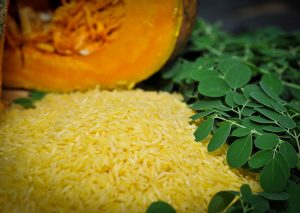THE Court of Appeals (CA) said an earlier ruling banning genetically modified organisms (GMO) applies only to golden rice and Bt eggplant, opening the door for applications to develop other crops.
The CA’s Former Fourth Division, in a 33-page decision issued on Aug. 15, removed item eight from its April 17 decision, which had stopped the field testing and use, as well as imports of GMOs until all measures are taken to ensure they are safe.
In the new decision, the court held that only “the circumstances, facts, and issues covering Golden Rice and Bt Eggplant were considered” in the previous ruling.
“Other applicants for the contained use, field testing, direct use as food or feed, or processing, commercial propagation, and importation of other GMOs, if any, were not impleaded in the instant case and not given the opportunity to be heard, whether verbally or in writing,” Associate Justice Jennifer Joy C. Ong, who wrote both decisions, said.
“Lest we be accused of violating (due process), the deletion of Item (8) of the dispositive portion of the assailed Decision is in order,” she added.
The motion to reconsider the earlier ruling had been filed by the departments of Agriculture (DA), Environment and Natural Resources, Health, as well as by the Philippine Rice Research Institute, and the University of the Philippines at Los Baños (UPLB).
These parties, through the Solicitor-General, said the Court’s directive under item eight hampers efforts to provide and discover new and valuable information through scientific research.
It added item eight negatively impacts the agriculture industry and biotechnology research.
However, apart from removing item eight, the Court said the other aspects of the decision still stand.
It reaffirmed its issuance of a Writ of Kalikasan to the petitioners, Magsasaka at Siyentipiko para sa Pag-unlad Agrikultura (MASIPAG), Greenpeace, and others.
“The paramount importance of this case is not difficult to discern, as it deals with the people’s constitutional right to a balanced and healthful ecology and perceived violations of the same,” the court ruled.
The decision to issue a cease-and-desist order halting the commercial propagation of Bt eggplant and golden rice remains in force, it said.
Teodoro C. Mendoza, a retired professor of agronomy from UPLB, told BusinessWorld via Facebook Messenger chat that the decision is a win for GMO advocates, and declared his support for the ruling, which has implications for crops beyond rice and eggplant.
“We don’t grow corn, the source of protein today that is cheap, because fish meal is expensive (as livestock feed),” he said. “We import a lot of corn because we cannot produce what the livestock industry needs. So if item eight is not suspended, the livestock industry will die.”
The motion for partial reconsideration cited a BusinessWorld article by columnist Ramon L. Clarete, explaining the Philippines’ need to import GMO yellow corn and soya meal for animal feeds.
Animal feed accounts for 60% to 70% of the cost of pork, poultry, and egg production.
The Court’s order to ban GMO imports would have serious adverse effects on the hog and poultry industries, the government said in its appeal.
The motion asked the court to give the DA time to source non-genetically modified corn and soya products.
The Supreme Court en banc had granted the petitioners a Writ of Kalikasan, referring the case to the appellate court.
MASIPAG, a coalition of farmers and scientists, requested a temporary environmental protection order against the DA to halt the commercial cultivation of golden rice and Bt eggplant, until evidence of safety and compliance with legal requirements is provided.
A Writ of Kalikasan is issued to safeguard individuals from environmental harm that jeopardizes life, health, or property across two or more municipalities. — Chloe Mari A. Hufana


















